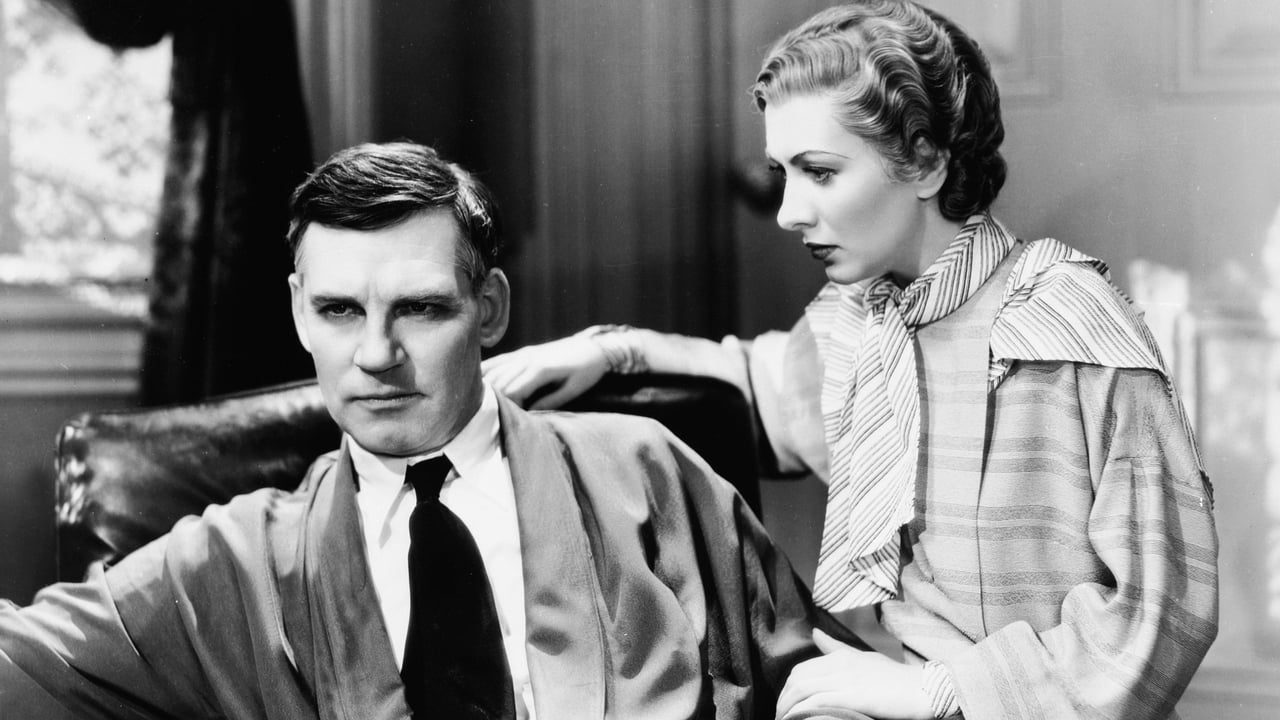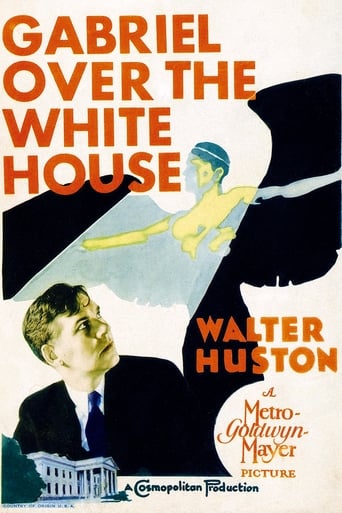

This film has caused many divided opinions over the years and continues to do so to this day. An industry insider introduced me to this curio, as a film made at MGM while Louis B. Mayor was on Vacation. His stand-in as studio production exec (and writer) at this time was: Cary Wilson (also known as narrator of the above average "Miniatures" series of classic shorts from Metro) Both he and the films Producer: Walter Wanger, wanted this film made and knew it had to be done in the absence of Mayor! Wanger at the time was known for intelligent socially provocative works, some may remember him for titles such as: "Scarlet Street" '45 ~ "Joan Of Arc" '48 ~ "I Want To Live" '58. To give 'Gabriel' a quality look, he sort financial backing from media giant, William Randolph Hearst. Rightly or wrongly, this film is often sited as a propaganda piece for Franklin D. Roosevelt, but it seems the film was actually produced in 1932, during the Hoover years - more about that later... At one stage during its basic story (credited to an 'Anonymous' novel) the working class poor stage a mass march on the White House as protest against impossible conditions. This event was based on the infamous march on Washington by returned WW1 vet's seeking their unpaid government bonuses...the rally ended badly when Hoover sent in US troops who, under the lead of General Douglass MacArthur attacked them with tanks and tear gas!Hearst was appalled by this act and made his views known via his publications. He then threw his full media support on contender, Roosevelt's campaign (although his support eventually fell away). The film's story go's on to suggest that perhaps, a fascist state under a benevolent dictator, may offer rational answers to quell some very real social ill's. In the poverty stricken 1930s, with world wide political systems that were not solving the problems of the day (and before the lessons of WW11) it becomes rather easy to see merit for this scenario - - but turn the pages of history back to Rome, and forward to Germany, Italy, etc, etc, it begs the question: who can you trust at the top with this level of power?! -- L.B.Mayor finally found out about this film while attending a preview in California. Much displeased, he held up its release, and many changes were made to the final release. No matter what your political views, or how you choose to interpret the propaganda slant of this movie, it makes one hugely important statement...that if mankind is going to bring about international peace, then it will need an out-of-this-world personality to head a government strong enough to maintain absolute integrity. No mere mortal throughout all of history, has proved to have any of the 'lasting' qualities necessary to achieve this, and as the world has seen time over time (especially today) I doubt any mortal will. The demolition demonstration, with comments regarding the 'monstrous' world wide spending on machines of war ~ vast amounts of massively expensive equipment that all becomes rapidly redundant, are based in logic and admirable.With it's truly impressive long list of committed veteran professionals in front of camera and behind, the film looks and sounds quite superb, and highly recommended to lovers of thoughtful vintage works of high integrity. Thanks to a very good friend, I now have a fine re-mastered Warner Archive DVD to enjoy all over again....KR
... View MoreFrom my introduction at the Library of Congress in 2012. The motion picture GABRIEL OVER THE WHITE HOUSE is a unique example of the genre of political drama, in fact it maybe the only Presidential biography movie as science fiction fantasy. Nancy Loe a historian and author on William Randolph Hearst sent an email to my wife Jenny this afternoon when she heard we were playing this film here tonight. And I quote: "Hearst's political ideas were directly expressed in his 1933 production entitled Gabriel Over the White House. The movie relates the story of President Jud Hammond (played by Walter Huston), whose ineffectual responses to the economic blight of the Depression satisfy only the corrupt political machine that secured his election. Through the intervention of a reporter (assisted by the angel Gabriel), Hammond abandons his passive Herbert Hooverish policies and transforms himself into "a dictatorial presence made in differing parts of Theodore Roosevelt, Abraham Lincoln, and Huey Long. Hammond is granite in feature, solemn in word, aggressive in manner, and unconstitutional in action." Both the screenwriter, Carey Wilson, and the producer, Walter Wanger, recall Hearst participating actively on this film, even to the point of writing or rewriting the Presidential speeches used in the movie. Hearst hoped the film would inspire additional public support for newly-elected President Franklin Delano Roosevelt. Hearst had not endorsed Roosevelt's Presidential aspirations until it became clear that Hearst's first choice, could not swing the necessary votes on the convention floor. Hearst agreed to release California's crucial delegates to Roosevelt from the Gothic Library, Hearst's private San Simeon office, and Roosevelt was duly nominated. Although he would soon break with Roosevelt, primarily over the issue of taxes on the wealthy, Hearst agreed with FDR that the first hundred days of the Roosevelt administration were crucial. Gabriel Over the White House, containing several references to the recent 1932 Presidential campaign, was a direct effort on Hearst's part to smooth the path for the real-life President he had helped into office." – Unquote. Made during the Pre-Code era the production code was more relaxed towards controversial story lines. The author of the novel that the film was based on Thomas Frederic Tweed who wrote the novel originally called "Rinehard" in England but changed to "Gabriel Over the White House : A Novel of the Presidency" for the U.S. I checked Amazon.com for copies of the book and only found three available selling for between $484 and $750.Tweed worked for a British politician David Lloyd George during the 1920's as a personal secretary. In the film he is portrayed by the Franchot Tone character. In real life he also fell in love with his bosses pretty personal secretary, in the film played by Karen Morley. But when he wrote his novel he changed the story to the 1950's and had it take place in the United States. But what was in the mind of the audiences of March 1933 when this film was brand new The Great Depression started in October of 1929 with the stock market crash setting off a decade of high unemployment (15-20% by time this film opened), poverty, low profits, breadlines, etc. causing a general loss of confidence in economic growth. The depression bottomed out in the winter of 1932/33, just as Roosevelt took over. There are some incidents based on fact like when the movie shows an army of the unemployed in real life in 1932 the Bonus Army marched on Washington and then President Hoover asked the Army to force them out. In the movie a better solution was found and many of other aspects of the new deal are hinted at like the Works Progress Administration and the Civilian Conservation Corps. In conclusion this is not a great film, actually a bizarre film with strange ideas but a work of fiction that is never boring. And it's a great chance to see little Dickie Moore one of the little rascals who plays the presidents nephew, who is still alive and turned 87 this past September 12. I hope you enjoy this unusual film.
... View MoreThe film is a sort of modern fairy tale and begins with the inauguration of a new President. This one is COMPLETELY unlike any other president (uh, huh), as he has absolutely no ambition to do or change anything--even though the country is in the midst of the Depression. When he's asked important questions at a press conference, his answers have absolutely nothing to do with what was asked. When there is an army of unemployed who are converging on DC (like the real-life 'Bonus Army' during the Hoover administration), he's shown playing with his young nephew--oblivious and happily so. To put it bluntly, he's a selfish and lazy jerk.When the President is in a motorcade, he behaves very irresponsibly--choosing to drive his own car AND drive it like a maniac. As he drives at 100 miles per hour, his escort can't even keep up and the audience knows something is about to happen. Naturally, there is an accident and he's expected to die. BUT, unexpectedly, he awakens and is physically fine, but is also a thoroughly changed man. Instead of the lazy jerk he'd been, he's now a good man ready for action--even if the Congress and his own Cabinet couldn't care less. Assuming near dictatorial powers, he now does exactly what needs to be done for good of the nation. And, in the process, he introduces an enlightened form of socialism for the good of America. How this all came to be and what happens next you'll just have to see for yourself.The film comes across as a very entertaining and well-meaning film--and clearly a product of the times. While most will no doubt enjoy it, the film scared the crap out of me. Although the film was not meant as a ringing endorsement for National Socialism (i.e., the Nazis), the message could easily be interpreted as approval for such a heavy-handed and all-controlling government that is acting 'for the good of the nation'. While in the case of this film the President is a benevolent dictator, such unhealthy desires for a tough guy who does what MUST be done (despite the Constitution) is a very dangerous idea indeed! Hitler himself sold his nation a similar bill of goods--which looked awfully attractive back in 1933. Hitler ALSO asked his congress to declare a state of emergency, dissolve themselves and grant him almost unlimited powers. At least this is my perspective as a history and government teacher.Well made, well meaning...and a bit dangerous. By the way, for you fans of classic Hollywood films, get a load of the performance of Mischa Auer as a reporter who confronts the President. His usual accent and European manners are just about completely absent here--probably one of the very few times he played a role this way during his career.
... View MoreNo need to repeat points already made about the film's interesting origin or plot line. For once, MGM's lavish production machinery is put to excellent use. The crowd scenes are quite convincing both in size and in tone. Catch that early scene where the silken Karen Morley makes an unexpected call on the newly sworn-in president. It's a minor masterpiece of adult-level innuendo, beautifully performed and directed. We know why she's there even if Franchot Tone's accommodating chief-of-staff takes a few moments to sink in. Yes, indeed, this is the White House and 30 years before the meandering young JFK. In fact, the script plays things revealingly cagey, never once disclosing Hammond's marital status-- a possible dictator, yes; but a possible philanderer, now that's just too touchy to reveal! In fact, the subject matter is, on the whole, intelligently handled, even if it has to include moments of occult intervention-- a reference that usually puts a strain on my digestive tract. Director La Cava knew how to keep results under control, which is key to the movie's success. Sure, it's primarily a document of its time, but when I read in today's news about a "unitary presidency", and "presidential signings exemptions" from the laws Congress passes, I'm not so sure that the past remains the past. Anyway, this wacky excursion into the realm of political fantasy stands as a one-of-a-kind and should not be missed.
... View More